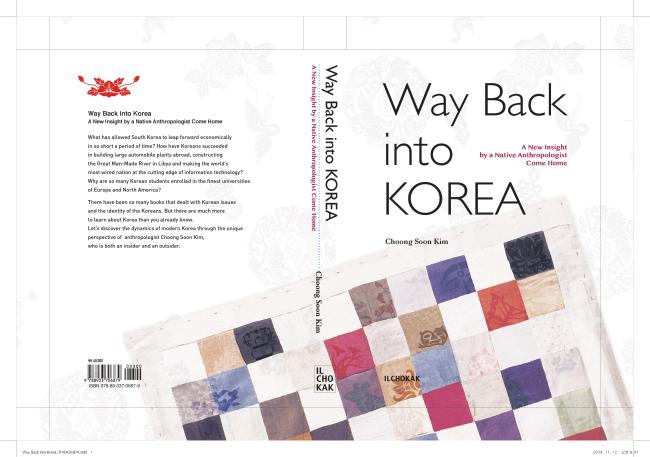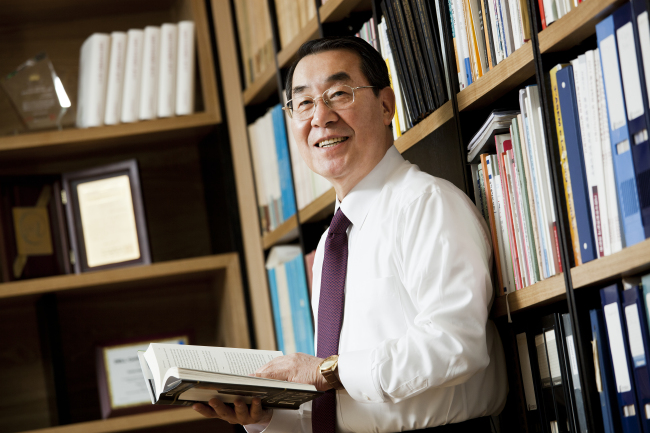“Way Back into Korea”
By Choong Soon Kim
(Ilchokak)
By Choong Soon Kim
(Ilchokak)

There is always the danger, with introductory books into Asian culture, of stereotyping and the spraying of names, dates and footnotes that seem almost impossible to remember.
Some of the earlier descriptions of Korea, such as the “hermit nation” and “land of morning calm,” fall short of portraying Korea’s fast-changing here-and-now. On top of that, the love-hate relationship between the flow and informativeness has long been a source of agony for authors and readers of these books.
“Way Back into Korea,” an introductory book on Korean culture by anthropologist Choong Soon Kim, delivers a remarkable balance between these two seemingly uncompromising missions.

A native anthropologist come home, Kim sheds candid insight to the wide gamut of socioeconomic, political and historical contexts of Asia’s fourth-largest economy in an intriguing narrative that keeps readers focused, while providing a solid precursor before digging into the current issues of Korea.
The book takes full advantage of two tools: the anthropological lens that gives the readers plenty of room to digest information and the author’s personal memories, being born in Korea in 1938. Those who experienced both Japanese colonial rule (1910-1945) and the Korean War (1950-1953), like Kim, constitute less than 10 percent of all living Koreans -- anthropologists among them comprise an even much smaller portion, which adds to the book’s invaluable accounts.
While many introductory books on Korean culture overly focus on its economic miracle -- the rapid transformation from a recipient of foreign aid to a donor -- Kim reveals an insider’s view on the actual social turbulence that Koreans -- both urbanites and the farming population -- had to undergo in the process of building up such a “miracle.”
This way, “Way Back into Korea” looks into the underexplained intricacies in Korean text and media -- obvious to nationals, yet not apparent for foreign readers -- that set the basic tools for further analyzing deeper social agendas, such as the challenges and dilemmas in female empowerment, multicultural families and political tensions surrounding certain native crops.
Not surprisingly, the book also provides precious insights for Korean nationals, by filling in the core building blocks -- Korean democracy, family kinship, rural villages, religion and education for moving up the socioeconomic ladder. The persistent Confucianism in the era of Korea’s first female president, Park Geun-hye, also broadens the scope of understanding of Korea.
“Way Back into Korea” thus brings out the underlying context of the most subtle topics on Korean culture, as well as Kim‘s academic erudition and unmistakable glimmers of brilliance throughout.
Born in Bonghwa, North Gyeongsang Province, Kim earned his doctorate in 1965 at Yonsei University in Korea. He received a master’s degree in sociology from Emory University and a Ph.D. in anthropology from the University of Georgia, and taught at the University of Tennessee for 30 years until 2001.
Since returning to Korea in 2002, Kim has been a forerunner in teaching Korean language to expats living in Korea. He is the president of the Cyber University of Korea and a professor emeritus of the University of Tennessee.
By Chung Joo-won (joowonc@heraldcorp.com)







![[Graphic News] More Koreans say they plan long-distance trips this year](http://res.heraldm.com/phpwas/restmb_idxmake.php?idx=644&simg=/content/image/2024/04/17/20240417050828_0.gif&u=)
![[KH Explains] Hyundai's full hybrid edge to pay off amid slow transition to pure EVs](http://res.heraldm.com/phpwas/restmb_idxmake.php?idx=644&simg=/content/image/2024/04/18/20240418050645_0.jpg&u=20240419100350)





![[From the Scene] Monks, Buddhists hail return of remains of Buddhas](http://res.heraldm.com/phpwas/restmb_idxmake.php?idx=652&simg=/content/image/2024/04/19/20240419050617_0.jpg&u=20240419175937)

![[KH Explains] Hyundai's full hybrid edge to pay off amid slow transition to pure EVs](http://res.heraldm.com/phpwas/restmb_idxmake.php?idx=652&simg=/content/image/2024/04/18/20240418050645_0.jpg&u=20240419100350)

![[Today’s K-pop] Illit drops debut single remix](http://res.heraldm.com/phpwas/restmb_idxmake.php?idx=642&simg=/content/image/2024/04/19/20240419050612_0.jpg&u=)